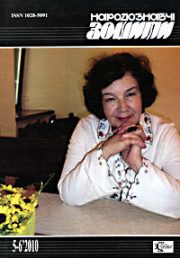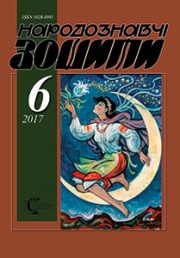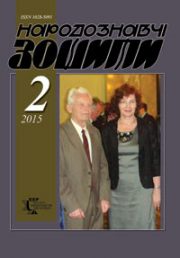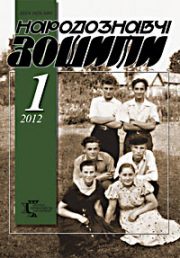The Ethnology Notebooks. 2020. # 6 (156), 1367—1382
УДК 801.81+ 811.161.2″38
DOI https://doi.org/10.15407/nz2020.06.1367
Tatiana BETSENKO
- ORCID ID: https://orcid.org/0000-0002-1936-6673
- doctor of philological sciences, professor
- Department of Ukrainian Language and Literature,
- Sumy State Pedagogical University A.S. Makarenko
- Str. Romenskaya, 87, Sumy, 40002
- e-mail: tpb2016@ukr.net
Knowledge of the nature of the phenomenon of language form, language syntax, language idea of thoughts is one of the primary tasks of linguistic analysis of this genre of folklore, because it opens prospects for understanding the essence and energy of thought discourse among other genres of folk art. This determines the relevance of the topic of scientific intelligence. The purpose of the article is to describe the fundamental components that integrally form the concept of text-image universality as a fundamental constitutive linguistic-structural unit of the Duma epic; to find out the nature of the textual and figurative universal — a natural constructive component of the epic folk-poetic improvised narrative, which synthesizes the unity of form, content and aesthetics in the figurative and symbolic content.
Theobject of scientific observation is the linguistic organization of Ukrainian folk dumas, the subject — text-shaped universals as nuclear structures that generate epic narrative, their common fundamental attributes and properties that characterize the purpose and functional role of these structures.
Research methods. The main research method is descriptive.
In the course of the research it was found out that text-like universals are universal signs of the language/speech system. In the article text-shaped universals are considered in their correlation with formulas. The correlation of the concept and text-shaped universal, folklore sign-symbol and text-shaped universal is determined. Attention is paid to the systemic nature of text-shaped universals. It is proved that the text-shaped universal is a linguistic model. The text-shaped universal is characterized as a linguistic-structural means of folklore improvisation, as a tool of folklore communication.
Conclusions. Thus, the textual-image universal is a cognitive-psychological mental formation embodied in the appropriate language form (model), which functions in the artistic (genre) continuum, reflecting the schematic image of the phenomenon, person, thing, based on evaluative semantics — typical (exemplary, exemplary) for a certain class of phenomena, things and is intended for the implementation of folklore communication (is a language code that ensures the preservation of information and serves as a means of transmitting it). We perceive text-image units as a traditionally conceived, canonized in a certain way in the folk genre unity of form, content, aesthetic content, focused on the preservation, transmission and reproducibility of the relationship. The concept of textual and figurative universality also tends to understand it as a kind of linguistic and aesthetic sign of national culture.
Keywords: text-shaped universal, formula, concept, sign-symbol, folklore, language of Ukrainian folk dumas, folklore communication, improvisation.
REFERENCES
- Ukhov, P.D. (1970). Attributions of Russian epics. Moscow [in Russian].
- Maltsev, G.I. (1981). Traditional formulas of Russian non-ritual lyricism. (To the study of the aesthetics of the oral poetic canon). Russian folklore (Vol.21, pp. 13—37) [in Russian].
- Jones, R. (1972). Language and prosody of Russian folk epic. Paris.
- Parry, M. (1930). Studies in the epic technique of oral versevaking. ln Harvard Studies in Classical Philology. Homen and Homeric Style (Vol. 41, pp. 73—148). Oxford.
- Lord, A.B. (1968). The Singer of Tales. New York.
- Peteneva, Z.M. (1985). Language and style of Russian epics. Lviv [in Ukrainian].
- Lotman, Yu.M. (1970). The structure of a literary text. Moscow [in Russian].
- Kumakhov, M.A. (1979). On the problem of the language of epic poetry. Questions of linguistics, 2. Moscow [in Russian].
- Yermolenko, S.Y. (1999). Essays on Ukrainian literature. Kyiv [in Ukrainian].
- Yermolenko, S.Y. (1987). Folklore and literary language. Kyiv [in Ukrainian].
- Astafieva, L.A. (1993). The plot and style of epics: Author’s abstract. dis. … doc. philol. Moscow: Sciences [in Russian].
- Bolotnova, N.S. (1992). Communicative universals and their lexical embodiment in a literary text. Philological sciences, 4. Moscow [in Russian].
- Tyukova, I.N. (2005). Communicative universals and their lexical embodiment in the lyrics of B.I. Pasternak: Author’s abstract. … Cand. philol. Sciences. Tomsk [in Russian].
- Chistov, K.V. (1986). Folk traditions and folklore. Essays on Theory. Leningrad [in Russian].
- (2000). Ukrainian language: Encyclopedia. Kyiv [in Ukrainian].
- Batsevich, F.S. (2004). Fundamentals of communicative linguistics. Kyiv [in
- Ukrainian].
- Polubichenko, L.V., & Egorova, O.A. (2003). Traditional formulas of a folk tale as a reflection of the national mentality. Bulletin of Moscow State University, 1 (Series 19). Moscow [in Russian].
- Selivanova, O. (2006). Modern linguistics. Terminological encyclopedia. Poltava. Kyiv [in Ukrainian].
- Kononenko, V.I. (2004). Concepts of Ukrainian discourse. Ivano-Frankivsk [in Ukrainian].
- Askoldov, S.A. (1997). Concept and Word. Russian Literature. From the theory of literature to the structure of the text. Moscow [in Russian].
- Karpenko-Ivanova, U. (2006). Frame «armed confrontation» in the Russian, English, Italian cultural and linguistic tradition. Kyiv [in Ukrainian].
- Vengranovich, M. (2005). Functional-style specificity of folklore text in the aspect of extralinguistic conditioning. Opole: Stylistyka [in Russian].
- Revzin, I.I. (1962). Models of language. Moscow [in Russian].
- Kirov, E.F. (1989). Theoretical problems of language modeling. Kazan [in Russian].
- Karpov, V.O. (1992). Language as a system. Minsk [in Russian].
- Zhinkin, N.I. (1982). Speech as a conductor of information. Moscow [in Russian].
- Gritsa, S. (1994). Endogenous nature of folklore. Philosophical and sociological thought, 7—8. Kyiv [in Ukrainian].
- Grigoriev, B.B., & Chumakova, V.I. (2002). Lexicon of semiology. Theory of signs in terms, concepts, names. Vladivostok [in Russian].
- 29.(1972). Ukrainian People’s Dumas. Moscow.
- (2007). Literary encyclopedia (Vol. 1). Kyiv [in Ukrainian].
- (2008). Ukrainian folklore: dictionary-reference book. Ternopil [in Ukrainian].
- Putilov, B.N. (1997). Epic storytelling: typology and ethnic specificity. Moscow.
- Gritsa, S.I. (1990). Ukrainian song epic. Moscow [in Russian].
- Ivanytsky, A. (1990). Ukrainian folk music. Kyiv [in Ukrainian].







